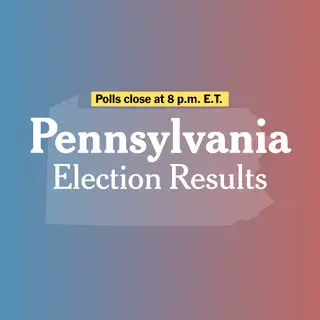Last night, May 20, 2025, Pennsylvania buzzed with excitement as voters flocked to the polls for the primary elections, setting the stage for November’s general election. The Pennsylvania primary results, updates poured in, revealing surprising outcomes and tight races that kept residents glued to their screens. From Philadelphia’s district attorney contest to Pittsburgh’s mayoral showdown, the night delivered drama, upsets, and a glimpse into the state’s political future. Let’s dive into the key moments and what they mean for Pennsylvania’s voters.
Pennsylvania Primary Results, Updates: Philadelphia’s DA Race Steals the Spotlight
In Philadelphia, the Democratic primary for district attorney captivated the city. Incumbent Larry Krasner, a polarizing figure known for his progressive reforms, faced off against Patrick F. Dugan, a former municipal court judge. Early returns showed a neck-and-neck race, but as precincts reported, Krasner pulled ahead, securing the nomination with a strategy that tied his campaign to broader national issues. His victory means he’s likely to cruise into a third term in November, as no Republican candidate emerged in the primary. Voter turnout in Philly was lower than expected, with only about 17.7% of registered voters casting ballots, a sharp drop from previous years. This race underscored the city’s deep Democratic roots and Krasner’s ability to rally his base despite a well-funded challenger.
Pittsburgh’s Mayoral Shake-Up: Pennsylvania Primary Results, Updates
Pittsburgh’s mayoral race delivered the night’s biggest shock. Incumbent Ed Gainey, the city’s first Black mayor, lost his re-election bid in the Democratic primary to Allegheny County Controller Corey O’Connor. With over 95% of votes counted, O’Connor’s win was called late Tuesday, marking a significant upset. O’Connor, the son of a beloved former mayor, leveraged his family legacy and strong financial backing to edge out Gainey. On the Republican side, Thomas West defeated Tony Moreno, but Pittsburgh’s Democratic dominance makes O’Connor the likely next mayor. This outcome signals a shift in the city’s leadership, with voters signaling a desire for fresh energy in City Hall.
Statewide Judicial Races: Key Contests to Watch
Beyond the big cities, Pennsylvania’s primary elections shaped the future of its judiciary. The Commonwealth Court and Superior Court races drew attention, with one vacancy each. In the Republican primary for Commonwealth Court, Matt Wolford defeated Josh Prince, a race called by the Associated Press. For the Superior Court, Maria Battista outpaced Anne Marie Wheatcraft in the Republican primary. Democrats had uncontested races, with their candidates advancing to November. These judicial seats are critical, as they handle cases involving state government and criminal appeals, respectively. The outcomes will influence Pennsylvania’s legal landscape for years, making these races a quiet but powerful part of the night’s story.
Voter Turnout and Local Highlights
Turnout across Pennsylvania varied, with urban areas like Philadelphia and Pittsburgh seeing lower participation than in past primaries. Posts on X highlighted early voting trends, showing Democrats outpacing Republicans in early returns, though Election Day votes leaned slightly Republican. In smaller races, Lancaster’s Democratic mayoral primary saw Jamie Arroyo dominate with 85% of the vote, setting up a likely win in November. Luzerne County voters backed a Home Rule Charter commission in Hazleton but rejected scrapping term limits in Nanticoke. These local contests, while less flashy, reflect the diverse priorities of Pennsylvania’s communities, from governance reforms to municipal leadership.
What’s Next for Pennsylvania?
As the dust settles, the Pennsylvania primary results, updates point to a dynamic general election ahead. With key nominees now set, campaigns will ramp up for November 4, 2025. The low turnout raises questions about voter engagement, especially in a non-presidential year. Will Krasner’s progressive agenda hold firm in Philly? Can O’Connor unite Pittsburgh’s Democratic base? And how will judicial races shape the state’s courts? These questions will fuel debates in the coming months. For now, Pennsylvanians can reflect on a primary that delivered surprises and set the stage for a high-stakes fall.
Stay engaged with Pennsylvania’s political pulse! Follow local news, check voter resources, and mark your calendars for the November 4 general election to make your voice heard.
